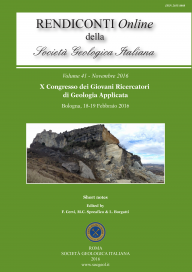
Determination of aquifer hydrodynamic parameters: a key tool for the design of an Open-loop Groundwater Heat Pump System
Glenda Taddia (a), Elena Cerino Abdin (a) & Stefano Lo Russo (a)
(a) Dipartimento di Ingegneria dell'Ambiente, del Territorio e delle Infrastrutture, Politecnico di Torino, e-mail: glenda.taddia@polito.it
Volume: 41/2016
Pages: 288-291
Abstract
Open-loop groundwater geothermal heat pumps (GWHP) represent an interesting technology that is expected to contribute significantly to the reduction of primary energy use for buildings heating and cooling needs especially in urban context. In the GWHP's design phases the geological and hydrogeological parameters must be accurately determined in order to maximize efficiency and minimize installation costs.
Physical properties of the aquifer such as the porosity and the thermal parameters of the aquifer framework have been usually obtained through field and laboratory geotechnical testing. Hydrogeological and hydraulic parameters of the exploited aquifer such as hydraulic conductivity and the storativity are usually obtained through pumping test.
As reported in literature, the prevailing component of the heat transfer in the aquifer induced by the water re-injection is related to the advection and therefore the determination of the real field groundwater velocity in transient and steady conditions is fundamental in the modelling of the thermal plume especially in the GWHP plant design phases. To this aim the pumping tests appear to be among the most useful field hydrogeological investigations to be performed in most cases. Such tests can also provide suitable information related to the aquifer productivity (specific discharge rate) and therefore can permit to assess if the GWHP plant requirement can be satisfied in terms of groundwater sustainable withdrawals. A real field pilot plant aimed to supply energy needs to the Architecture Faculty building of the Politecnico di Torino (NW Italy) is presented and discussed.
Keywords
Get Full Text